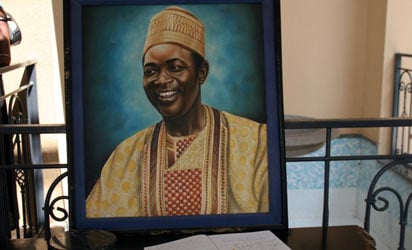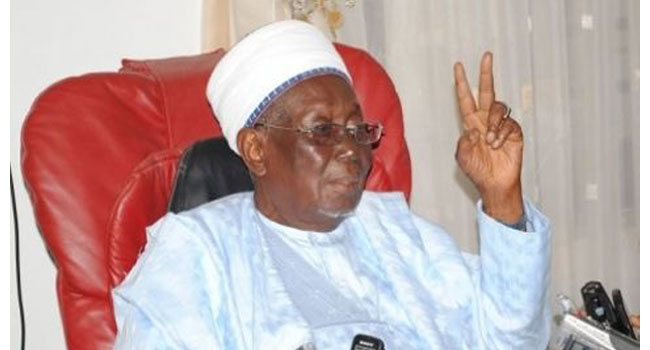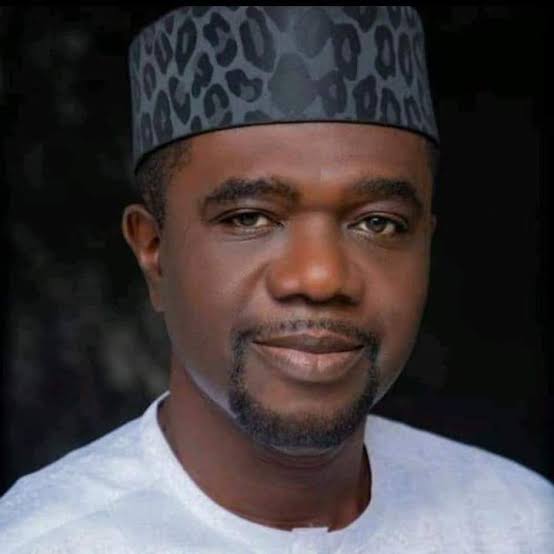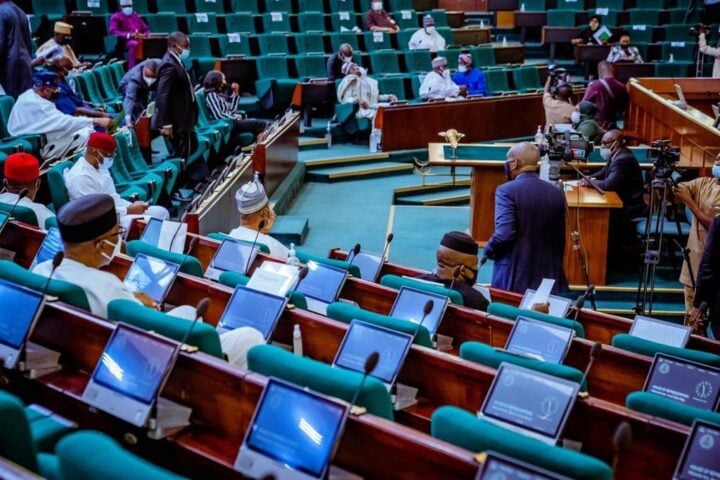BY YUSUPH OLANIYONU AND SARAFA LAWAL
Today, it will be exactly ten years that Dr. Abubakar Olusola Saraki, the Leader of the Senate in the Second Republic and strong man of Kwara Politics left the terrestrial plane. The man fondly called Oloye by his numerous admirers is being remembered today as always in thousands of homes where he made positive impact in numerous ways.
In Ilorin, a mammoth crowd will gather at the Central Mosque for a prayer session. Also, a memorial lecture is to hold on November 28 at the International Conference Centre (ICC), Abuja, to celebrate some of the ideals that the late medical doctor lived for and exemplified in his 79 years sojourn on the earth. Prof. Patrick Lumumba, the Kenyan anti-corruption crusader and pan-Africanist, will address the issues arising from the Leadership and Followership Debate.
In the Twelfth Night, William Shakespear, states that “Some are born great, some achieve greatness, while some have greatness entrusted upon them.” Late Dr. Saraki was born into greatness on May 17, 1933, as his father, Alhaji Mutairu Saraki, a wealthy textile merchant with big business concerns in Lagos and Abidjan, and his wife, Alhaja Humuani Ayinke Saraki from Iseyin, were elite by all standards of that time and now. His ancestors were migrant Fulani merchants and Islamic scholars from present-day Mali who had settled over 200 years back in Agoro Compound, Agbaji Quarters, Ilorin. His grandfather was Mallam Abubakar Agoro.
Advertisement
Saraki grew up in Lagos where he attended Breadfruit Memorial School, Lagos for his primary education between 1940 and 1945. He was afterward admitted into the Eko Boys High School from 1946 to 1947. However, since his father wanted him to be a medical doctor and Eko Boys High School was not offering science subjects, he moved to Reverend Lucas College, Lagos where he completed his secondary education. As a very brilliant, hard-working student whose academic record was impressive, his father sponsored his education in England where he first attended the Regent Street Polytechnic and the Woolwich Polytechnic for his Advance Level GCE between 1952 and 1953. He passed excellently and was admitted into the University of London to study medicine from 1956-1959. He completed his MBBS degree at the St. George’s Hospital Medical School in 1962.
Before he obtained the MBBS degree, he had obtained a Diploma Certificate from the Royal College of Physician (LRCP, London) and Royal College of Surgeon MRCS (England) and thus was qualified to be appointed as a House Surgeon at St. Gregory Hospital, London, between 1962 and 1963. As a student in London, Dr. Olusola Saraki was involved in campus politics. He led a delegation of Nigerian students who paid a courtesy visit to the Saraduna of Sokoto, Sir Ahmadu Bello when the latter was in London to attend the 1957 constitutional conference ahead of the enactment of the Oliver Lyteltton Constitution
He returned to Nigeria to work as a medical officer at the General Hospital, Lagos, and the Creek Hospital, Onikan, also in Lagos. He resigned in his second year in public service to start a private practice with the late Dr. Ikomi. The Saraki-Ikomi Hospital was established on Creek Road, Apapa, Lagos. Today, Dr. Olusola Saraki has produced the third generation of medical doctors, after his son and granddaughter successfully bagged degrees in medicine from the same University of London.
Advertisement
The signs that Dr. Saraki was set to achieve greatness became manifest too early in his life. As a medical officer in Lagos, he was known for always intervening to pay the medical fees of indigent patients and demonstrated kindness, care, and compassion to patients, members of the junior staff, and the communities. He did not stay too long in public service as a professional as he moved out into private practice and ran several business concerns. These were manifestations of the streak he got from his businessman father and a mother who was a highly respected trader.
By the time of the parliamentary elections in 1964, Dr. Saraki who was to be later renowned with the sobriquet ‘Oloye’ had started making philanthropic and community service interventions in Ilorin, his hometown. The young medical doctor became convinced that no matter how much an individual tried, his impact in alleviating poverty and uplifting people will still be limited and that public office remains the best means to positively make an impact in the lives of a large number of people. He focused on four broad areas of service to humanity: Community development, promotion of education and human capacity development for the children of the less privileged, poverty alleviation and empowerment as well as encouraging religious harmony.
He offered to be elected into the House of Representatives in the First Republic on the platform of the Northern Peoples Congress (NPC), then headed by Sir. Ahmadu Bello, the Sardauna of Sokoto. Unfortunately that year, the NPC came out with a policy to return all its members to the Federal Parliament. Saraki then contested as an independent candidate. Of course, for the rookie politician, his efforts could not match that of the ruling party’s structure. The young man returned to his medical practice and businesses in Lagos. He however did not stop his massive community service and philanthropy in Ilorin, the old Kwara State which extended to today’s Kogi State and part of Niger State.
When the military decided to return power to civilians in 1979, elections were conducted in 1978 to elect members of the Constituent Assembly. The people of Kwara State decided unanimously to send the new kid on the block to speak for them. Thus, he became part of the people who decided what political future the post-military Nigeria should have. Incidentally, the Constituent Assembly also became the forum for discussion on the formation of parties and a platform for those who want to seek top political office to network with others.
Advertisement
Saraki became one of the main men who formed the National Party of Nigeria (NPN) which became the ruling party in the Second Republic. He was one of the key financiers and a first-eleven, most valuable player. He was one of the presidential aspirants who keenly fought for the party’s ticket in Lagos. He came fourth behind the eventual winner, Alhaji Shehu Shagari, Alhaji Yusuf Maitama Sule, and Mallam Adamu Ciroma. His fellow Kwaran, Akanbi Oniyangi came fifth.
As the Second Republic government was formed, Saraki became the first Senate leader in the new presidential system that the Constituent Assembly in which he was a member recommended. He was later to be turbaned as the third Turaki of Ilorin and promoted later to the Waziri before his death. In the four years and three months that he spent in the Senate before the military sent the Second Republic packing, Saraki had achieved greatness as a national household name.
With the tremendous resources with which he was blessed by almighty Allah, he had become the benefactor to many across the country, particularly, in Kwara State. He was a helper of the helpless. He fed the hungry and provided succour to all who went to him for help and various needs. If you got to Ilorin, his home town and you were stranded, the taxi driver or the man on the streets will direct you to Saraki’s Ilofa Road home, otherwise called ‘Ile Loke’ for a bailout. There are testimonies of many individuals who got sorted out in Saraki’s Ilorin home and had their problems resolved. His house became everybody’s home. A social welfare centre. Many students got scholarships to attend Nigerian and foreign universities and polytechnics from Saraki.
Many people founded the businesses that later grew into multi-million naira concerns with seed money coming from the Oloye. The medical bills he paid saved many lives. His kindness uplifted many individuals. He contributed funds to save many widows and their suffering children.
And then he started the famous Ile Arugbo where old people gathered to get fed, received medical attention, and take away clothing materials and money anytime Oloye was in town. He would always personally attend the launching of community development projects and make generous donations. He was the one who built schools, health centres, community halls, culverts, bridges linking communities, and religious houses like mosques and churches in many communities across the country. He was the major donor in the reconstruction of the Ilorin Central Mosque before the commissioning by President Shehu Shagari in 1980. His son, Abubakar Bukola Saraki as Kwara State Governor was to later lead the renewed efforts that led to the present world-class edifice that today defines the Ilorin skyline. He sponsored many people on the holy pilgrimage to Saudi Arabia and Jerusalem.
Advertisement
A very simple, humble, and unassuming politician, Saraki won the hearts of the people with his empathy, kindness, compassion, and ability to relate with ordinary people like one of them. He genuinely cared about the people. For example, he once established a bakery, Ayinke Bakery, at a time when bread was so scarce and expensive in Ilorin and ensured it was sold at subsidized rate to make it affordable to ordinary people. He was always in his element when relating with ordinary people in the streets, the communities, and rural areas. He was a grassroots politician. He deliberately created a cult loyalty among the womenfolk who were always there in the rain or sunshine to protect his interests. His ability to display empathy was almost unrivaled among politicians of his era. A man who spoke the Lagos dialect of Yoruba, he also conversed in Hausa, French, and English.
During the Babangida transition Programme, Dr. Saraki was a presidential aspirant on the platform of the Social Democratic Party (SDP). He formed the Congress for National Convention (CNC) when the late General Sani Abacha initiated the return to civil rule under his administration.
Advertisement
In 1998, Oloye Olusola Saraki became a national leader and member of the board of trustees of the All People’s Party (APP) contributing to the APP’s success in Kwara and Kogi states. Late Dr. Saraki assisted many individuals across the country to realise their political aspirations. Most of the people who became governors under the APP platform in 1999 benefitted from his financial support. They included Rear Admiral Mohammed Alabi Lawal (rtd), Alh. Bukar Abba Ibrahim, Alhaji Attahiru Bafarawa, Alh. Adamu Aliero, Sen. Ahmed Sani Yerima, and many others. There are many Senators, representatives, state legislators, and political appointees who got to various offices with the support of the Oloye.
The Oloye was known as an unrepentant advocate for the unity of the country. He was a renowned bridge-builder, who, by the fact of his ancestral origin and disposition, was a bridge across all the divides in our country.
Advertisement
Dr. Saraki had a huge and fanatical grassroots support across the country in general, particularly in his home state, Kwara. He committed his resources and time to the empowerment and development of these supporters. He made deep sacrifices to promote participatory democracy in which the ordinary people would be politically conscious enough to have a say in key decisions affecting their lives and ensure they can exert a strong influence on the actions of their leadership. He wanted an enlightened follower-ship that can work for the emergence of visionary leadership required for the overall development of our country. Before his death, all the six elected governors who ever governed Kwara State in his lifetime won their election with the endorsement of God who used Oloye Saraki to support them.
To confront the developmental challenges facing the Northern part of the country, Oloye formed the Northern Union (NU) in 2005. The NU became a platform for creating unity between the North and the South but most importantly for rallying the top northern elite to work together in tackling the developmental challenges facing the area. In 2006, the NU organised a nationwide tour of the country to canvass support for a power shift to the North. The tour lasted ten months and was used to further cement a good relationship between the two geo-political regions in the country. Oloye was a man who strived and worked hard for national unity, peace, cohesion, and understanding.
Advertisement
He died on November 14, 2012, and since then his name still decided the shape of the politics of his state. He exemplified the significance of the saying that some build their castle with brick and block while some build their castle in the minds of men. The castle built with brick and block shall one day crumble and become dust while the ones in the minds of men shall live and remain solid forever. Dr. Saraki was 79 when he left the terrestrial plane for the celestial one.
He was married to Chief (Mrs.) Florence Morenike Saraki, a member of the prominent Ibidapo family in Owo, Ondo State. They both have four children – Dr. Abubakar Bukola Saraki who became Governor of Kwara State and later President of the Senate of the Federal Republic, Senator Ruqayyah Gbemisola Saraki who served for 12 years in the National Assembly and now Minister of State, Federal Ministry of Mines and Steel Development, Mrs. Fatimah Temitope Edu, a legal practitioner, and businesswoman as well as Mr. Mutair Laolu Saraki who was one time Special Assistant to late President Umaru Musa Yar’Adua. Today, the Saraki family stands tall as one of the only two Nigerian nuclear families to have produced three senators each. The other family is the Adeleke Family from Osun State. However, while the Saraki family has put in 20 years and three months into the service of the Nigerian Senate, the Adeleke family has put in 12 years and three months.
Truly, his many legacies live on.
Olooye!!! Oloooye!!! Olooooooyeeeeee!!!
Olaniyonu and Lawal write from Ilorin
Views expressed by contributors are strictly personal and not of TheCable.
Add a comment






